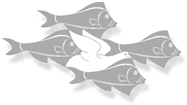

|
|
|
|
V. Ostromoukhov, R.D. Hersch,I Amidror
Computer Graphics Proceedings, Annual Conf. Series, Siggraph, 1994, pp. 123-130
Rotated dispersed-dot dither is proposed as a new dither technique for
digital halftoning. It is based on the discrete one-to-one rotation of a Bayer
dispersed-dot dither array. Discrete rotation has the effect of rotating and
splitting a significant part of the frequency impulses present in Bayer's
halftone arrays into many low-amplitude distributed impulses. The halftone
patterns produced by the rotated dither method therefore incorporate fewer
disturbing artifacts than the horizontal and vertical components present in
most of Bayer's halftone patterns. In grayscale wedges produced by rotated
dither, texture changes at consecutive gray levels are much smoother than in
error diffusion or in Bayer's dispersed-dot dither methods, thereby avoiding
contouring effects.
Due to its semi-clustering behavior at mid-tones, rotated
dispersed-dot dither exhibits an improved tone reproduction
behavior on printers having a significant dot gain, while maintaining
the high detail rendition capabilities of dispersed-dot
halftoning algorithms. Besides their use in black and white
printing, rotated dither halftoning techniques have also been
successfully applied to in-phase color reproduction on ink-jet
printers.
Download the full paper: PDF 700KB
![]()
![]()
![]()
![]()
![]()